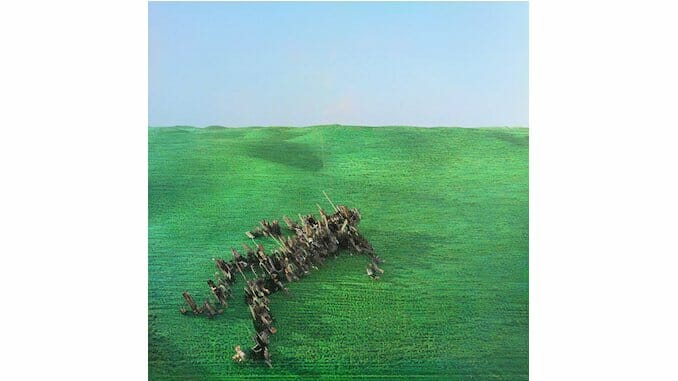Introducing Endless Mode: A New Games & Anime Site from Paste
Toward the end of Squid’s debut album Bright Green Field comes a brief moment of liberation. “Well, I’ve always been told what to do,” the narrator of “Peel St.” mumbles, “but now, I’m free / There’s no warden following me.” Whether the prison from which this character has been released is literal or one of the mind is left for the listener to decide, and most of the details underpinning Bright Green Field’s paranoid, dystopian universe are similarly vague. More immediately apparent is Squid’s utter disregard for rock convention—where drummer-vocalist Ollie Judge’s words leave gaps in his Orwellian brutalism, his chainsaw of a shout-speak and his band’s squawking guitars fill in the blanks.
Though Bright Green Field is easily Squid’s most musically varied and ambitious work yet, the British quintet—whose contemporaries include black midi and Black Country, New Road—remains thematically tethered to the pervasive anxiety and fear that have defined them from their 2019 breakout single “Houseplants” through last year’s Sludge / Broadcaster 10”, their debut for storied electronic and experimental label Warp. If anything, Bright Green Field—co-written by the entire group and produced by Speedy Wunderground mastermind Dan Carey—raises the band’s longtime stakes. Where “The Cleaner,” the highlight from 2019’s Town Centre EP, hinted at simultaneously more abrasive and hooky grooves to come, Bright Green Field delivers on that promise without diminishing Squid’s madness.
Take the nearly nine-minute behemoth “Narrator” as a prime example. Here, Judge’s mumbles of “I’ll play my part!” gradually grow into frantic shouts as guitars swirl like tornadoes into a climax of horror-flick shrieks and wails. With every subsequent repetition of this lyric, it seems increasingly likely that Judge’s character is desperately defending himself to the whole world even though nobody is actually watching him. “2010” is similarly nauseous in both its calmest and most violent moments: As its narrator loses himself amidst the sickening pull of corporate life, the music suddenly transforms from crisp, dissonant arpeggios into a frenzy of Schlagenheim-like overdriven guitar blasts. It’s a breakdown that could make even the most suited-up stockbroker start throwing fists, kind of like that scene from Soul where the hedge fund manager suddenly finds his purpose, but if he found The Armed instead.
Bright Green Field comprises more than just this foaming-mouth tension and ire. Seven-and-a-half-minute adventure “Boy Racers” begins as an insomniac nightmare of dueling post-punk guitars that dance around each other like two figure skaters off their Xanax, but halfway in, it decomposes into a drone passage as disgusting as it is gorgeous. This formless synth passage, which sounds like a UFO descending into a mosh pit in the desert, is shockingly devastating for a band that typically makes its points with guitars and vocals that both shout viscerally. At certain points during this drone, you can hear fragments of the voice memos that the band sourced from 30 or so people and subtly spliced into Bright Green Field. Their presence is so minor that you might question whether they’re actually there, which is how Judge’s characters seem to feel about their entire surroundings throughout the album, whether on the “concrete island” of “G.S.K.” or amidst the agoraphobia of “Pamphlets.”
These voice memos appear so sparingly throughout Bright Green Field that consciously searching for them elicits feelings of frustration like those the album’s characters seem to experience 24/7. On “G.S.K.,” there’s a heavily filtered vocal underlying Judge’s sneers of “I’m speeding along” that could be a voice memo, or it could just be, you know, typical studio processing on a typical studio vocal. I could swear the first time I listened to the slow-as-molasses breakdown of “Global Groove,” I heard at least three different voices trying to break free from an old tape recorder, but on subsequent listens, it just sounds like two different voices interwoven from separate recordings. Or it’s just one voice with tons of effects that reflect how excessively paranoia can distort reality. It’s tough to know for sure, and that’s the point.
“Global Groove” is also a rare Bright Green Field song that shows some prior tendencies that Squid could stand to forgo. In only briefly surpassing a modest rumble, it recalls the stillness of Town Centre’s stagnant closer “Rodeo.” “Documentary Filmmaker” feels similarly restrained for a band so adept at unleashing full mayhem, though the minor buildup about halfway through briefly elevates the track. The tranquility does make one thing unmissable: “Oh, I know, “Judge laments as the loudness fades, “He’s filming all the time.” Is “he” the warden from “Peel St.”? The details of Bright Green Field’s Big Brother are never quite clear, and that’s fitting for an album that positions the whole world as the enemy. That we get such an uncompromising view into this paranoia is Bright Green Field’s biggest gift.
Sometimes, Max Freedman sits and writes about music, and sometimes he just sits. Follow him on Twitter, where he has been hailed as “an incredible person with an incredibly bad internet connection.”
